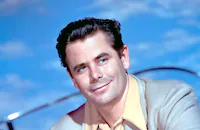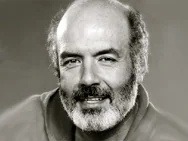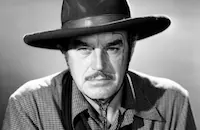The Sheepman

Brief Synopsis
Cast & Crew
George Marshall
Glenn Ford
Shirley Maclaine
Leslie Nielsen
Mickey Shaughnessy
Edgar Buchanan
Film Details
Technical Specs

Synopsis
The placid cattle town of Powder Valley is thrown into disarray by the arrival of self-assured, cheerful Texan Jason Sweet. Moments after arriving on the train, Jason gives Dell Payton unsolicited advice on handling her horse, smooth-talks the tack store owner into a deal on a new saddle and outwits Milt Masters into selling Jason his best horse. Learning that the town bully is Jumbo McCall, Jason seeks him out at the local diner and knocks him out in a fistfight, then informs the startled townspeople of his intention to settle in Powder Valley and raise sheep. Outraged, several cowboys warn Jason that Powder Valley is the center of cattle country, but Jason remains confident. On his way to the hotel, Jason hires Milt to be his confidant on the town's goings-on. That afternoon, Dell visits Jason in his hotel room to advise him against bringing sheep to the valley as their presence will disrupt the town's recently won tranquility. Jason dismisses Dell's concern and assures her that he wants no trouble. In the lobby, Jason is met by Jumbo, who is under orders to escort him to the town's most important resident, known as the Colonel. After Jason demonstrates his nimble quickness with a gun, however, Jumbo reluctantly withdraws. Later at Chinese Willie's diner, Jumbo and several of the Colonel's men interrupt Jason's dinner to force him to go to the Colonel's lavish home. There, Jason is surprised to meet Col. Stephen Bedford, whom Jason recognizes as former Texas outlaw Johnny Bledsoe. Bledsoe explains the necessity of assuming a new identity to go "straight," and that over six years he has honestly earned his reputation in Powder Valley. When Bledsoe advises Jason not to unload his sheep, which are scheduled to arrive the next day, Jason maintains his intention to settle peacefully. The next morning, Jumbo leads a gang of Bledsoe's men to the station to meet the train carrying Jason's herd. Although Bledsoe is Dell's fiancée, she pleads with her father Frank to prevent Bledsoe's turn to lawlessness. Meanwhile, Jason asks the town marshal for help, but the marshal insists on going fishing instead, pointing out that he was elected by Powder Valley cattlemen and is obligated to them. Dell intercepts Jason and offers to spirit him out of town past the gathering crowd congregated at the train station. Jason accepts and hides in Dell's buckboard wagon, only to alight on the other side of the station, where he races to the water tower. After the train arrives, Jumbo and several men menace Jason's unarmed assistant Angelo in his attempt to unload the sheep. The men are then abruptly scattered by several firecrackers set off by children hired by Jason. With Jumbo and the men in disarray, Jason covers Angelo from the tower, allowing the sheep to be unloaded without further incident. Over the next several days, Jason and Angelo set up camp and settle the sheep into an unclaimed area of the valley. When Jason goes into town for supplies and is refused service, Jason tells Milt to inform Bledsoe of his intention to get the provisions. After a shave and haircut, Jason finds his wagon loaded with the requested supplies and Bledsoe apologizes for any misunderstanding. Some time later, Jason is surprised when Dell rides into his camp to tell him that the cattlemen have met and agreed that they may have treated Jason unjustly. Dell then invites Jason to the upcoming annual Fourth of July celebration and, although suspicious, he accepts. A few days later, Jason arrives at the party where Milt cautions him to be on his guard, but Jason is delighted by the friendly atmosphere. Later talking with Dell, Jason admits that after visiting Powder Valley long ago he had decided it was the ideal community. The festivities come to an abrupt stop at the sound of a train whistle, which Bledsoe informs Jason is a signal that his sheep have been rounded up and placed on board a train. Bitter about the betrayal of the townspeople, Jason allows Bledsoe to take him to the station where he, Milt and Angelo are placed on the train, which departs immediately. Unknown to Bledsoe, Milt has a pistol, which Jason uses to force the engineer to return to Powder Valley. There, Jason confronts the townspeople and accuses Bledsoe of secretly purchasing all the surrounding grazing land. Bledsoe insists he has done so as the representative of the cattlemen's association, but Jason reveals the purchases are in Bledsoe's name only. Bledsoe threatens Jason and departs to arrange for hired gun Choctaw Neil to come to town. The next morning Choctaw and his men arrive and at Bledsoe's request head for Jason's camp. While out riding with Dell, Jason learns that she has broken her engagement with Bledsoe because of his duplicity. Hearing gunshots a little later, Jason races to his camp and, finding Angelo wounded, takes him to town with Dell. There, Milt advises Jason of Choctaw's arrival. Choctaw confronts Jason in the street, but spotting Choctaw's men situated at several spots nearby, Jason refuses to be provoked into a gunfight. Dell urges Milt to join her in helping Jason, and reluctantly Milt agrees. When Dell tells Jason that Choctaw's men have been disarmed, Jason accepts Choctaw's challenge and quickly kills him. Jason thanks Dell, then hurries to Bledsoe's ranch. In the ensuing fight, Bledsoe wounds Jason before being killed by him. Some weeks later, with peace restored to Powder Valley, the townspeople are startled to see Jason's sheep being herded on board a train by Jumbo. Jason admits to Dell that he is selling his sheep to buy cattle as he has never been fond of sheep. When Dell expresses confusion, Jason explains that he took a stand because he does not like being told what to do by others. Dell then invites Jason to lunch and he accepts, on the condition that she acknowledges that he is the boss.

Director

George Marshall
Cast

Glenn Ford

Shirley Maclaine

Leslie Nielsen

Mickey Shaughnessy

Edgar Buchanan

Willis Bouchey

Pernell Roberts

Slim Pickens
Buzz Henry
Pedro Gonzalez Gonzalez
Wes Hudman
Percy Helton

Roscoe Ates
Norman Leavitt
Billy Newell
Forrest Lewis
Lee Tung Foo
Burt Mustin
G. Pat Collins
Tom London
Harry Harvey Sr.
Peggy Taylor
Lorraine Carol
Brandy Bryan
Edith Clair
Tom Greenway
Dick Rich

Harry Woods

Dan White
Irene Barton
Lane Bradford
Bill Hale
Les Hellman
Frank Marlowe
Crew
Jeff Alexander
William Bowers
Robert Bronner
Malcolm Brown
Charles Coleman
Henry Grace
Edmund Grainger
James Edward Grant
James Edward Grant
Sydney Guilaroff
Charles Hagedon
Jim Henderling
Robert R. Hoag
William A. Horning
Hugh Hunt
Al Jennings
Dr. Wesley C. Miller
William Plunkett
William Roberts
Ralph E. Winters

Photo Collections
Film Details
Technical Specs

Award Nominations
Best Writing, Screenplay
Articles
The Sheepman
The plot - a roving rancher decides to bring a trainload of sheep into cattle country and runs afoul of the local cattle baron - has the structure of a traditional Western but its distinctive sense of humor sets it apart from other films in the genre. Certainly the script by William Bowers and James Edward Grant sprinkles comic gems throughout the traditional storyline - a knack both men honed individually from years of alternating between genres, writing for John Wayne and Clark Gable as well as Bob Hope and Abbott and Costello. One of the more famous gags is Glenn Ford's first entrance into the frontier saloon where he orders a glass of milk from the bar.
The main credit for the charm of this CinemaScope rib tickler goes to veteran director George Marshall, who, after more than three decades on both sides of the camera, managed to rack up enough comedic credits to open a movie clown school. No stranger to the farcical oater, having previously scored with 1939's Destry Rides Again, Marshall was also responsible for some of the best work featuring Hope, Laurel and Hardy, W.C. Fields and Martin & Lewis. His remarkable expertise with seasoned supporting players is well-evidenced here by the scene stealing antics of Edgar Buchanan, Mickey Shaughnessy, Pedro Gonzalez-Gonzalez and Slim Pickens - an education that a pre-pratfall Leslie Nielsen, portraying the third wheel in the picture's romantic triangle, no doubt relished with glee.
In her autobiography, My Lucky Stars, Shirley MacLaine recalls working with the star of The Sheepman: "Glenn Ford decided I should learn to smoke a cigar. I did and threw up. Then he put my cowboy hat under his horse to "christen" it. Glenn definitely looked into my eyes, and told me his life story with women. I was fascinated, but frankly much more interested in the news that the ghost of Rudolph Valentino inhabited the house he lived in with Eleanor Powell. He said Valentino would sometimes move the furniture around and put on music that he had loved to tango to. Glenn loved the presence....Eleanor didn't. When I told him that Eleanor was my father's favorite star and dancer, Glenn was not amused. He was competitive with Eleanor. He hadn't resolved their split. But Glenn was a darling man with a dry sense of humor. We became good friends, though not as good as he'd have had some people think."
Director: George Marshall
Producer: Edmund Grainger
Screenplay: William Bowers, James Edward Grant, William Roberts
Cinematography: Robert J. Bronner
Editor: Ralph E. Winters
Art Direction: Malcolm Brown, William A. Horning
Music: Jeff Alexander
Cast: Glenn Ford (Jason Sweet), Shirley MacLaine (Dell Payton), Leslie Nielsen (Johnny Bledsoe), Mickey Shaughnessy (Jumbo McCall), Edgar Buchanan (Milt Masters), Pernell Roberts (Chocktaw Neal), Slim Pickens (Marshal).
C-83m. Letterboxed. Closed captioning.
by Mel Neuhaus

The Sheepman
Quotes
Was he very bad?- Dell Payton
Well, let's just say that he wasn't in any danger of getting a headache from the weight of all the gold stars on his crown.- Jason Sweet
How come you get into the sheep business, boss?- Angelo
Well, I'll tell ya, Angelo. You see, it's this way. I just got tired of kicking cows around. You know how dumb they are.- Jason Sweet
And you think sheep are smarter?- Angelo
Oh, no, no. They're dumber. Only their easier kicking...and woollier.- Jason Sweet
Trivia
Notes
Working titles for the film were Too Big for Texas and The Trail West. Hollywood Reporter news items indicate that the film was shot on location near Montrose, CO. The picture was nominated for an Academy Award in the Writing (Story and Screenplay-Written Directly for the Screen) category.

Miscellaneous Notes
Released in United States Spring May 1958
CinemaScope
Released in United States Spring May 1958














